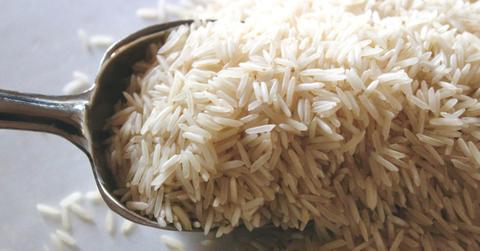Store-Bought Rice Contains Dangerous Levels of Arsenic, According To Report
Arsenic is a carcinogen and exposure to the heavy metal can be very dangerous.
Published May 19 2025, 9:57 a.m. ET

Rice is a go-to ingredient for so many households. Between Asian cuisine and easy-to-make dinner ideas, U.S. residents eat an average of 27 pounds of it a year, according to Think Rice.
However, a 2025 study claims that store-bought rice could be hiding a dangerous secret: Arsenic.
According to the report, 100 different brands came back with higher-than-acceptable levels of arsenic and other heavy metals. These contaminations are considered especially harmful for vulnerable populations, like children and those who are pregnant or planning to become pregnant.
Keep reading to learn more about the report, including why rice contains arsenic in the first place.

Why does rice contain arsenic?
As we mentioned, arsenic is a heavy metal. It's naturally occurring and can be found in different places, including in plants and animals (organic arsenic) and in soil and water (inorganic arsenic), according to All Recipes.
The inorganic arsenic is especially toxic, and unfortunately, found in high concentrations in rice. This is mainly because of the way rice is grown, which involves rice paddy fields that require large amounts of water and soil.
This type of growth method is especially susceptible to contamination thanks to water runoff and irrigation practices, which increases the levels of inorganic arsenic that the rice plants come into contact with.
Adding to the problem is the fact that rice is especially good at absorbing the arsenic in the soil and groundwater it grows in, essentially creating a sponge that soaks up the heavy metal toxin.
According to the World Health Organization (WHO), food and water are the largest sources of arsenic exposure for most people. This is especially harmful when occurring through ongoing or long-term exposure, which can cause many different health complications in adults, including but not limited to:
- Cancer
- Skin lesions
- Cardiovascular disease
- Diabetes
Study finds high levels of arsenic in many store-bought brands of rice.
Knowing that rice is naturally high in arsenic, you may be surprised to learn just how much of it makes its way into the stores where you shop. According to a 2025 report from Healthy Babies, Bright Futures, 100 percent of the 145 rice products it tested came back positive for arsenic.
Of those products, more than a fourth exceeded the limits set by the U.S. Food and Drug Administration (FDA) for infant cereal.
While the report notes that the FDA has not imposed limits on rice in general, many children and infants do consume these foods, which could put them at risk of the health complications associated with arsenic exposure, which include:
- Increased risk of cancer
- Neurological complications
- IQ loss
- And more...
How to reduce your arsenic exposure when eating rice.
While the news that rice contains so much arsenic may be concerning, Healthy Babies, Bright Futures notes that there are several ways to reduce exposure while eating rice. Some of them involve eating rice that is known to be lower in heavy metals, like California rice, Jasmine rice, and Basmati rice.
Additionally, the report says that rinsing your rice (both before and after cooking it) can also lower your exposure to arsenic.